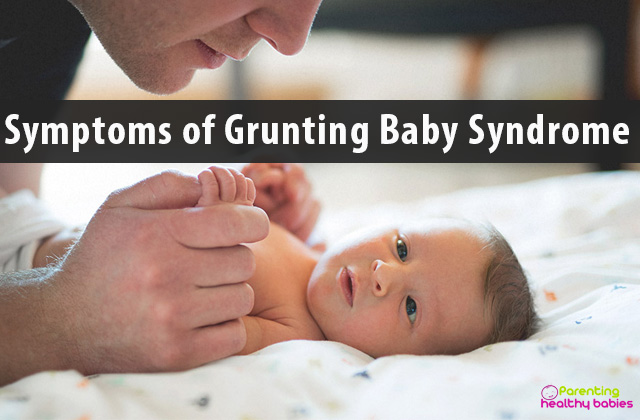As a new parent, it must be very difficult for you to understand what your baby wants, why he or she is crying and what makes him or her uncomfortable many times a day. It is not a very easy task to interpret the actions of your baby all the time, but a knowledge of the possible things that can make him or her uncomfortable and what makes them cry can certainly help. Baby grunting syndrome is one such thing at least whose basics you should know about as a parent. Don’t worry we have made things much simpler for you! In this article, you will get to know everything about grunting baby syndrome.
A Guide for Grunting Baby Syndrome
What is grunting baby syndrome?
Grunting baby syndrome or baby grunting syndrome is not a formal or technical term. It refers to the sounds made by your baby when he or she tries to have a bowel movement. As a new parent, this might frighten you of course, but there is nothing to worry about as this is perfectly normal. It is seen quite a lot in babies and there are physiological reasons behind this.
Why does the infant grunting syndrome happen?
The infant grunting syndrome usually occurs because of indigestion or some other problem related to digestion. It is basically your baby getting used to having the mother’s milk and adapting to its formula. This happens usually after the baby is fed and when he or she probably has a gas building up inside their stomach and exerting pressure on it. But they don’t know how to move it through as they are not very acquainted with the normal bowel movements.
The physiological reason behind grunting is that since the baby does not know how to relax the pelvic floor while putting pressure on his or her abdominal muscles, they are unable to move stool through their body very easily and hence feel uncomfortable. Their abdominal muscles not being entirely developed are weak, and so they have to bear down with the diaphragm against the glottis, which is the closed voice box. This makes the baby produce grunting noises.
The process of grunting is actually a normal reflex that helps the baby push in order to pass their stool. But grunting does not let them relax the muscles in the end for a proper bowel movement and this is what makes them uncomfortable. This, in turn, leads to grunting baby syndrome. Thus, your baby keeps grunting until he or she is finally relieved when the bowel is passed.
Read More: 11 Effective Home Remedies for a Stool That is too Hard to Pass
What are the symptoms of grunting baby syndrome or baby grunting syndrome?
You will be surprised to know that the syndrome we are discussing is not really a syndrome; in fact, it is not even an abnormality. It is just your baby feeling uncomfortable because he or she is not used to the usual bowel movements that we as adults are used to. The following are the symptoms that you will observe in your baby when this happens:
- Crying
- Making sounds (which is called grunting)
- Straining
- Pushing or trying to push
- Squeezing the tummy muscles
- Turning purple or red while having a bowel movement
Usually, your baby is going to undergo bowel movement after five to ten minutes of each episode. In fact, the grunting will continue until the stool is passed and your baby is relieved.
Should you be worried about the grunting baby syndrome?
The infant grunting syndrome is basically a reflex due to the fact that your baby is feeling uncomfortable when he or she is not able to pass the stool very easily when he or she wants to. This is very normal and is seen in many babies during their infancy. If you find your baby grunting but see that the problem is solved when the bowel movement takes place, there is nothing to worry about. This is completely a normal physiological process.
However, if your baby is grunting constantly and has a blue tongue or lips or a constant fever, it might be indicative of some respiratory distress. Make sure you seek immediate medical attention in such cases. If you are not sure as to whether your baby is grunting normally or is facing some other problem, do not hesitate to visit a doctor immediately to rule out possibilities of something serious.
How long does baby grunting syndrome continue?
The grunting baby syndrome is usually observed in infants till ten to twelve weeks of age. This is actually the period when your baby is not used to bowel movements and does not know how exactly it happens. So, by around three months of age, this should stop. This age does vary with different developmental constraints. But if it continues for long, make sure you visit your pediatrician as soon as possible, just to be sure.
Is grunting baby syndrome same as constipation?
Although both of these are related to bowel movements, they are not at all same. While constipation is the inability to produce excreta properly, your baby will show grunting baby syndrome when his or her excretory system is working perfectly and just that he or she cannot figure out how to pass the stool through.
Does grunting baby syndrome indicate acid reflux?
Under normal circumstances, the answer to this question is “no” as grunting might take place without acid reflux as well. Both are completely different scenarios and not always dependent on one another.
How should grunting baby syndrome be treated?
Since baby grunting syndrome is not some abnormality it is best to leave it as it is without any treatment. Some parents believe in stimulating the anal opening with something such as a q-tip for the muscles to relax so that the stool passes easily. However, that prevents the baby to learn the operations of the muscles himself or herself. Therefore, babies should rather be allowed to do on their own.
If you are still worried about whether your baby’s grunting is just because of this, or you feel that there is something wrong with the baby, feel free to visit a pediatrician without delay. After all, it is always better to be safe than sorry!













